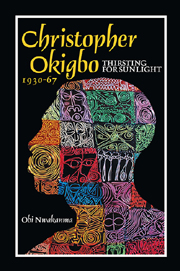Book contents
- Frontmatter
- Contents
- Preface
- Acknowledgements
- Chronology
- Dedication
- Photographs
- Maps
- Okigbo family tree
- 1 A river goddess, his mother's death & a headmaster father
- 2 Sportsman, actor & ‘effortless genius’
- 3 Cricket, classics, politics & urbane dissipation
- 4 Colonial civil servant, covert businessman & bankrupt
- 5 Poetry gives purpose to his voice
- 6 A librarian ravenous for literature & women
- 7 Gentleman, poet & publisher
- 8 Aftermath of a coup, running arms & advancing to death
- Epilogue
- Index
8 - Aftermath of a coup, running arms & advancing to death
BIAFRA 1966–67
Published online by Cambridge University Press: 05 April 2013
- Frontmatter
- Contents
- Preface
- Acknowledgements
- Chronology
- Dedication
- Photographs
- Maps
- Okigbo family tree
- 1 A river goddess, his mother's death & a headmaster father
- 2 Sportsman, actor & ‘effortless genius’
- 3 Cricket, classics, politics & urbane dissipation
- 4 Colonial civil servant, covert businessman & bankrupt
- 5 Poetry gives purpose to his voice
- 6 A librarian ravenous for literature & women
- 7 Gentleman, poet & publisher
- 8 Aftermath of a coup, running arms & advancing to death
- Epilogue
- Index
Summary
O Mother mother Earth, unbind me; let this be my last testament; let this be
The ram's hidden wish to the sword the sword's secret prayer to the scabbard –
(‘Elegy for Alto’, Path of Thunder)Dramatic events led to the secession from the Federation of Nigeria of the Eastern region, which declared itself the Republic of Biafra. This soon led to the civil war in which an estimated three million people died. Among the early casualties was the poet of Labyrinths. The exodus of the people of Eastern region from the rest of Nigeria became a flood. There was much anger also in people who had lost relations or friends in the senseless killings following the 29 July counter-coup. The pogrom against ethnic Igbo across the country forced many to the conclusion that for safety they must return eastwards to the region secured by Colonel Chukwuemeka Odumegwu-Ojukwu (whose name became shortened in the overseas press as Emeka Ojukwu). Shocked crowds of displaced people poured into the East, heightening the mood of discontent. Many managed to escape death, but there were many who returned limbless, bitterly scarred, emotionally broken. Death seemed too easy. Families were separated. Every day at the railway station in Enugu, there were gory spectacles: disemboweled women; beheaded corpses; people with eyes gouged from their sockets; children maimed forever by the poisonous anger of their generation; mothers wailing for their dead children; men relapsing into the restless embrace of madness, unable to withstand the devastation of their homes. Each new day, as the victims of the crisis arrived home, the anger rose in the East and, with it, the resolve of the people to protect themselves from the siege.
- Type
- Chapter
- Information
- Christopher Okigbo 1930–67Thirsting for Sunlight, pp. 229 - 258Publisher: Boydell & BrewerPrint publication year: 2010

